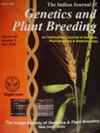Assessment of agro-morphological traits and yield-based tolerance indices in sesame (Sesamum indicum L.) genotypes under drought stress
IF 0.8
4区 生物学
Q3 PLANT SCIENCES
引用次数: 0
Abstract
Sesame (Sesamum indicum L.) is one of the most important oilseed crops of the world, particularly tropical areas. Its production issignificantly affected by drought stress. The present study was performed to assess the efficiency of existing criteria for the selectionof tolerant cultivars while evaluating sesame genotypes under drought conditions. Various agro-morphological traits along with somedrought tolerance indices were used to evaluate 15 sesame genotypes under drought conditions. A moderate to high heritability wasestimated for plant height (0.55), no. of capsules (0.72), capsule diameter (0.60), no. of seeds per capsule (0.43) and seed yield (0.53).On average, the seed yield of genotypes was reduced by 45% under water stress. Seed yield was significantly positively correlatedwith the no. of capsules, capsule diameter, and no. of seeds per capsule under both normal and drought conditions. The number ofcapsules and capsule diameter were suggested as potential criteria for indirect yield selection under drought stress. Chinese (G01), Naz Chand Shakhe (G05), and Darab1 (G04) genotypes were identified as the most tolerant based on the average ranking of indices. Stress/non-stress production index (SNPI), yield index (YI), and drought resistance index (DI) were suggested as the most efficient drought tolerance indices according to principal component analysis and correlations. The evaluation criteria proposed in this study can be used for efficient selection of drought-tolerant genotypes in sesame. Moreover, reported tolerant and sensitive genotypes can be used in future studies and breeding programs in sesame under drought stress.干旱胁迫下芝麻(Sesamum indicum L.)基因型农业形态性状及产量耐受性指标评价
芝麻(Sesamum indicum L.)是世界上最重要的油料作物之一,特别是热带地区。其产量受干旱胁迫影响显著。本研究是在评估干旱条件下芝麻基因型的同时,评估现有的耐受性品种选择标准的效率。利用不同的农业形态性状和抗旱性指标对15个芝麻基因型进行了干旱条件下的评价。株高遗传力中~高(0.55);蒴果数(0.72),蒴果直径(0.60);每粒蒴果的种子数(0.43)和种子产量(0.53)。在水分胁迫下,各基因型的种子产量平均降低45%。籽粒产量与产量呈极显著正相关。胶囊,胶囊直径,和no。在正常和干旱条件下每个蒴果的种子数。在干旱胁迫下,荚果数和荚果直径可作为间接产量选择的标准。根据各项指标的平均排名,鉴定出中国(G01)、纳兹昌德沙赫(G05)和Darab1 (G04)基因型的耐受性最强。通过主成分分析和相关性分析,认为胁迫/非胁迫生产指数(SNPI)、产量指数(YI)和抗旱性指数(DI)是最有效的抗旱指标。本研究提出的评价标准可用于芝麻抗旱基因型的高效选择。此外,所报道的耐受性和敏感性基因型可用于未来的芝麻干旱胁迫研究和育种计划。
本文章由计算机程序翻译,如有差异,请以英文原文为准。
求助全文
约1分钟内获得全文
求助全文
来源期刊

Indian Journal of Genetics and Plant Breeding
PLANT SCIENCES-
CiteScore
1.80
自引率
10.00%
发文量
0
审稿时长
6-12 weeks
期刊介绍:
Advance the cause of genetics and plant breeding and to encourage and promote study and research in these disciplines in the service of agriculture; to disseminate the knowledge of genetics and plant breeding; provide facilities for association and conference among students of genetics and plant breeding and for encouragement of close relationship between them and those in the related sciences; advocate policies in the interest of the nation in the field of genetics and plant breeding, and facilitate international cooperation in the field of genetics and plant breeding.
 求助内容:
求助内容: 应助结果提醒方式:
应助结果提醒方式:


